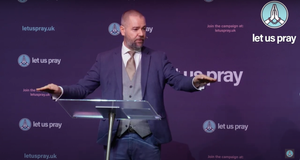‘Our gospel did not come to you in word only, but also in power, and in the Holy Spirit, and in much assurance’ (1 Thessalonians 1:5).
Far too often our preaching is one-dimensional – ‘in word only’. The preacher feels satisfied to ‘deal with the passage’ and instruct his hearers. Minds are informed but hearts and wills remain unmoved.
By contrast, apostolic preaching was four-dimensional. It came ‘not only’ in word but also in power, in the Holy Spirit, and in assurance. To recognise this could be the first step to recovery.
Story telling
Recognising the fruitlessness of so much evangelical preaching, some have concluded that ‘the word’ is outmoded and must be abandoned. Instead they advocate interactive discussion, narrative (story-telling), and pop-psychology that boosts our egos and ups the feelgood factor.
But Paul’s gospel did come ‘in word’! It was a preached gospel. This first dimension of preaching is not sufficient of itself but it is a necessary starting point. Mark the words, ‘not only but also’. The other dimensions of apostolic preaching were superadded to the message preached.
But what are these other dimensions? What does Paul mean by power, the Spirit, and assurance in the context of preaching?
Power
‘Power’ here is the Greek word dunamis, from which derives our word ‘dynamic’. It means inherent ability or ‘power residing in a thing by virtue of its nature’ (Strong’s concordance).
The gospel has inherent power because of its nature – it is a message from God not man. Paul writes, ‘I am not ashamed of the gospel of Christ for it is the power of God to salvation’ (Romans 1:16).
The preacher may forget that he is God’s ambassador, relaying God’s word not his own. Preaching is not a performance or an exercise in erudition. Nor is it primarily a work of encouragement. It is a message from the living God mediated through human agency.
The vessel may be earthenware but the content of every sermon should be the treasure of ‘the knowledge of the glory of God in the face of Jesus Christ’ (2 Corinthians 4:5-7). To remember this will surely make a difference to our preaching.
The Holy Spirit
Paul’s third dimension is ‘the Holy Spirit’. Interestingly, Paul makes a distinction between the power of the gospel and the power of the Holy Spirit – not only here but also in 1 Corinthians 2:4, where he writes, ‘my speech and my preaching were … in demonstration of the Spirit and of power’.
The distinction lies in a difference between intrinsic and extrinsic power. The gospel always has intrinsic power because of its nature as God’s revealed word. But there is a separate and distinct work in which God bears witness to the spoken word by the special operation of his Holy Spirit (compare Hebrews 2:3-4).
Unlike the inherent power of the word, this superadded activity of the Spirit is mysterious and sovereignly bestowed (John 3:8).
This is borne out by experience and church history. The same preacher declaring the same message with the same intrinsic power may see little fruit for years and then reap a great harvest. ET’s February front page related such a case. The Spirit’s sovereign work may bring regeneration, reformation or revival – but only according to his sovereign will and operation.
Assurance
Paul’s ‘fourth dimension’ is the personal and spiritual response engendered in his hearers – they received the gospel ‘in much assurance’. It filled their hearts with certainty and joy. Seldom do we see such responses in those who sit under the ministry of the word today.
Part of our problem is that we don’t expect it. We should look and pray earnestly for people to be affected and changed under the preaching – whatever their spiritual state. Unless believers are moved and motivated by the gospel in all its fulness, they will be lethargic and ineffective in witnessing to its power.
And this responsibility rests not only on the preacher but also on believing hearers. Do we attend the ministry of the Word diligently and with true anticipation? Do we listen merely to a man, or to ‘what the Spirit says to the churches’? (Revelation 2:7 etc.).
Four-dimensional preaching is the need of the hour; let us labour and pray for it.



















